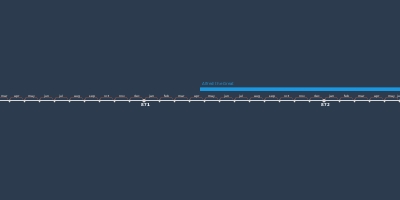War of the Spanish Succession (jul 1, 1701 – aug 1, 1714)
Description:
Triggered by the death of the childless Charles II of Spain in November 1700. Having suffered from ill-health all his life, his death was anticipated almost from birth and his successor debated for decades. Unlike France or Austria, the Crown of Spain could be inherited through the female line. This allowed Charles' sisters Maria Theresa and Margaret Theresa to pass their rights as rulers onto the children of their respective marriages with Louis XIV and Emperor Leopold. Despite being opponents in the recent Nine Years' War/War of the League of Augsburg, Louis XIV and William III of England now attempted to resolve the Succession by diplomacy. In 1685, Maria Antonia, daughter of Leopold and Margaret, married Maximillian Emanuel of Bavaria and they had a son, Joseph Ferdinand. The 1698 Treaty of the Hague or First Partition Treaty between France, Britain, and the Dutch Republic made the six year old heir to the bulk of the Spanish Monarchy and divided its European territories between France and Austria. The Spanish refused to accept the division of their Empire and on 14 November 1698, Charles published his Will, making Joseph Ferdinand heir to an independent and undivided Spanish monarchy. When he died of smallpox in February 1699, the claim was passed to Leopold's sons, Joseph and Archduke Charles. This was of doubtful legality but France, Britain and the Netherlands used it to devise the 1700 Treaty of London; Archduke Charles became the new heir, with Spanish possessions in Europe split between France, Savoy and Austria. Leopold refused to agree the provisions of the Treaty giving France most of Italy while Spain continued to insist on an undivided monarchy. Charles amended his Will in favour of Archduke Charles but on 2 October, replaced him with Louis' grandson Philip, Duke of Anjou.Charles left an undivided Spanish Monarchy to Louis XIV's grandson Philip, who was proclaimed King of Spain on 16 November 1700. Disputes over separation of the Spanish and French crowns and commercial rights led to war in 1701 between the Bourbons of France and Spain and the Grand Alliance, whose candidate was Archduke Charles, younger son of Emperor Leopold.
By the end of 1706, Allied victories in Italy and the Low Countries forced the French back within their borders but they were unable to make a decisive breakthrough. Control of the sea allowed the Allies to conduct successful offensives in Spain, but lack of popular support for Archduke Charles meant they could not hold territory outside the coastal areas.
When his elder brother Joseph died in 1711, Charles succeeded him as Emperor, undermining the primary driver behind the war, which was to prevent Spain being united with either France or Austria. The 1710 British election returned a new government committed to ending it and with the Allied war effort now dependent on British financing, this eventually forced the others to make peace. The war ended with the 1713 Treaty of Utrecht, followed in 1714 by the treaties of Rastatt and Baden.
In return for confirmation as King of Spain, Philip V renounced his place in the line of succession to the French throne, both for himself and his descendants; Spain retained the bulk of its possessions outside Europe, while its territories in Italy and the Netherlands were divided between Austria, Britain and Savoy. The Dutch Republic was granted its Barrier Fortresses, while France acknowledged the Protestant succession in Britain and agreed to end support for the Stuart exiles.
In the longer term, the commercial provisions of Utrecht confirmed Britain's status as the leading European maritime and commercial power. Others included the decline of the Dutch Republic as a first-rank power, the creation of a centralised Spanish state and the acceleration of the break-up of the Holy Roman Empire into larger and more powerful German principalities.
Added to timeline:
Date:
jul 1, 1701
aug 1, 1714
~ 13 years
